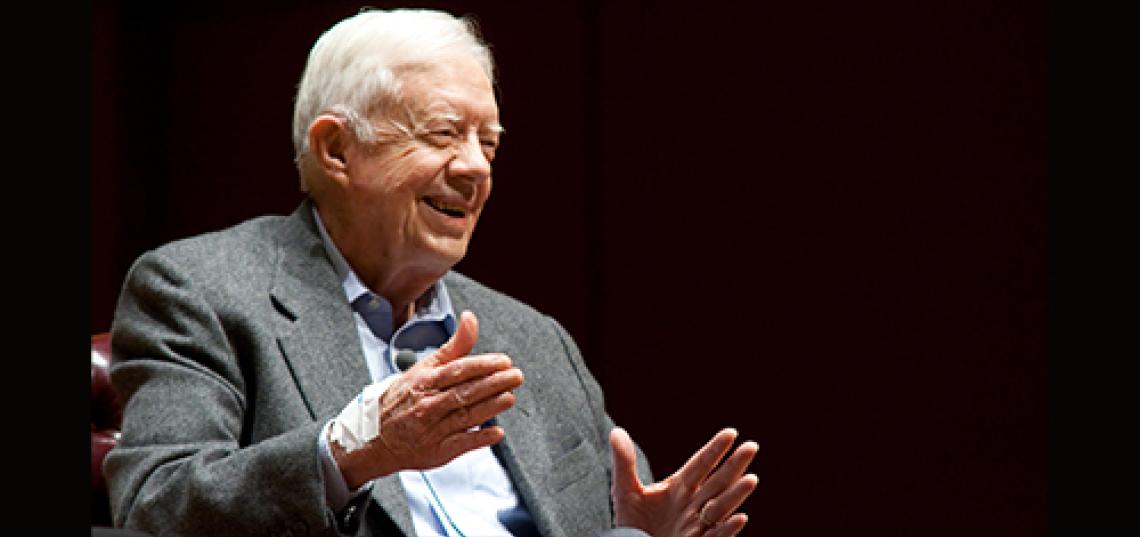
By Megan Schumann, Rutgers University Communications
Jimmy Carter, the longest living president, who served one term in the White House from 1977 to 1981, recently entered hospice care at the age of 98 after surviving brain cancer and other health issues.
David Greenberg, a professor of history and journalism and media studies and an expert on American political and cultural history – including the presidency – talked to Rutgers Today about Carter’s life and legacy.
What are some things most people don’t know about Jimmy Carter?
Over the years, Carter has been somewhat forgotten. And it’s been a long time since he served, so younger people probably don’t know much about him. In particular, I think people forget what a long shot he was to win the presidency. He was a one-term governor of Georgia and not considered the likely nominee in 1976, but he won the Iowa caucuses and was catapulted into the media spotlight. Especially after Watergate, there was a feeling of excitement associated with his coming into office.
How do you think his presidency rates in history?
Carter had a lot of admirable political views and instincts, but his presidency will probably be rated near the bottom or at best as mediocre. He had terrible troubles domestically, as he was unable to control combined inflation and unemployment. And he probably had even bigger headaches in foreign policy, with the Iranian hostage crisis and the Soviet invasion of Afghanistan. He lost the support of liberals and conservatives alike, and he was voted out of office after only one term.
That said, he did achieve some important things. In foreign policy, he oversaw the historic Camp David peace agreements between Israel and Egypt and the return of the Panama Canal to Panama. Domestically, he was strong on the environment. He was correct about warning Americans to decrease our reliance on fossil fuels, even though he didn’t quite have the leadership or political skills to move us very far in that direction.
What about his accomplishments after he was president?
His post-presidency was a mixed bag. People talk about it effusively, but they don’t always know the true record. Carter has been widely admired – and rightly so – for his involvement with Habitat for Humanity, which builds homes for the poor. He became deeply involved in monitoring elections in foreign countries, which was a key to expanding democracy. And his center fought for the eradication of diseases in Africa and other poorer parts of the world.
On the other hand, all the other presidents actively disliked him. He went around their backs and tried to interfere with their foreign policies. He lobbied other countries to go against Bush Sr. when he was trying to build a coalition to resist Saddam Hussein’s invasion of Kuwait. He undermined Clinton on North Korea. He also veered into what a lot of people – Jewish and non-Jewish alike – considered antisemitism with his remarks about Jews and Israel. It was a sad betrayal of the important work he had done at Camp David. His successors as president found him self-righteous – seeming to think he should still be president.
How was he different than other presidents?
He came from an unusual background. He grew up in segregated rural Georgia. His father was a dyed-in-the-wool racist from one of the most racist parts of the country. But his mother was liberal on race and taught him to treat Black and white people equally. He was faulted for being “AWOL” during the civil rights movement, but then as governor of Georgia he dramatically declared the age of segregation to be over. He was elected president on the strength of Black votes but then disappointed African Americans by not doing more to address the plight of Blacks in the inner cities.
Do you think he is more consequential than other one-term presidents?
Even one-term presidents are consequential. Carter’s diplomacy at Camp David and in the Panama Canal issue were major accomplishments. He tried to put human rights at the center of foreign policy, although he was uneven in his execution of that goal. Domestically, his legacy has been less well remembered. Inflation was a huge problem when he took office and he struggled to contain it. He did appoint Paul Volcker to run the Federal Reserve, and Volcker’s policy of raising interest rates worked – but only after a lot of economic pain that lasted beyond Carter’s own presidency.
When people remember him fondly, what do you think they will be focused on?
Carter will be remembered, I think, as a man with good impulses but whose own rigidity, superciliousness, and lack of experience stood in his own way – and who, to be fair, had to govern America at a very difficult time. He will be remembered for trying to talk about a “crisis of confidence” during a low point of national morale, but also as someone who was unable to resolve that very crisis that he identified.
I think the main things people focus on with Carter will be his down-home style, which was charming; the Camp David accords; his struggles with economic issues; and the hostage crisis. But people also admired his earnest style and that shapes the memory of him, too. He was hardworking and came into office at a tough time. He was not a particularly effective president, but he did work hard on behalf of the American people, and that commitment and earnestness remain a key part of his image.
Discover more about the Journalism and Media Studies Department at the Rutgers School of Communication and Information on the website.
THis article was first published in Rutgers Today on February 23, 2023.
Photo: Nir Levy/Shutterstock
